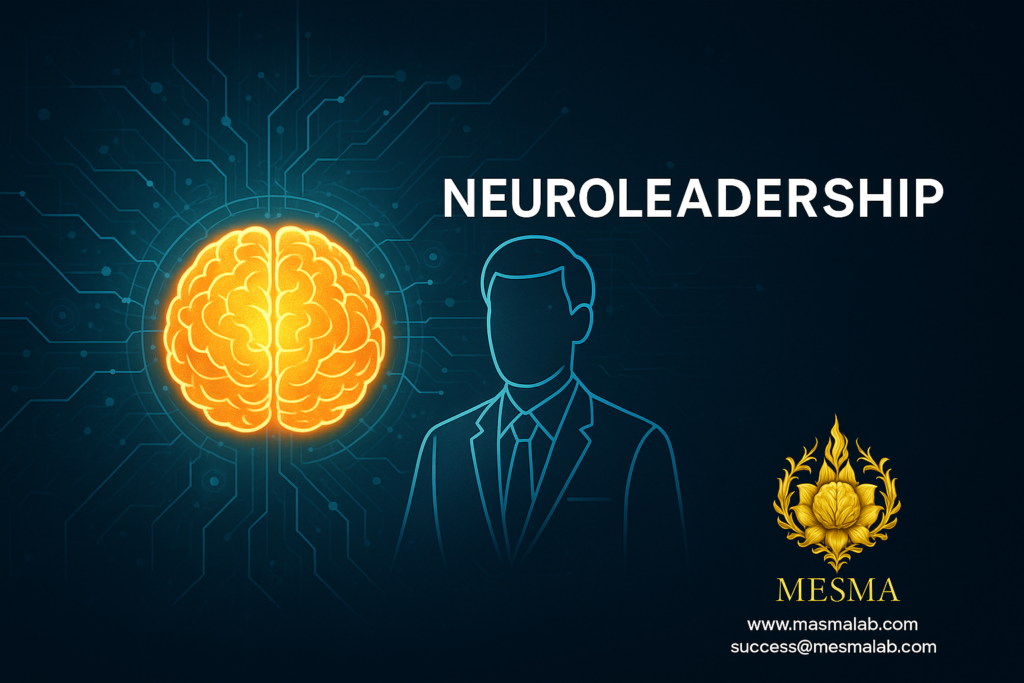Future Proof Leadership
“Leadership is not about titles or positions — it’s about the state of mind you bring to the moment.”
— Sathish Sampath, Founder of MESMA Lab
From boardrooms to living rooms, from startup founders to homemakers, the one trait that separates impactful decision-makers from overwhelmed reactors is this: neural readiness. And the science is clear — this readiness can be trained through mindfulness and neuroplasticity.
NeuroLeadership, where your brain, when cultivated mindfully, becomes the most powerful leadership tool you own.
🧠 What Is NeuroLeadership?
NeuroLeadership is the integration of neuroscience + leadership to help individuals lead more consciously, ethically, and effectively. It emphasizes the biological basis behind leadership skills like decision-making, empathy, focus, and resilience.
At MESMA Lab, NeuroLeadership is taught not as a technique — but as a neuro-behavioral shift that is measurable, trainable, and sustainable.
“Leadership is not about commanding others — it’s about managing yourself. The brain is the first boardroom.”
— Dr. David Rock, pioneer of NeuroLeadership
🧠 + 🧘 Why Mindfulness Is the Missing Link in Leadership
Modern leadership demands focus under chaos, empathy under pressure, and clarity amid complexity. These aren’t just soft skills — they’re neural skills.
🔬 Here’s how mindfulness affects the brain’s leadership centers:
- Prefrontal Cortex (PFC) – The CEO of the brain
Responsible for executive functions like planning, judgment, and impulse control.Mindfulness strengthens the PFC, enabling better strategic decisions. - Anterior Cingulate Cortex (ACC) – The mental conflict-resolution hub
Critical for adapting behavior and focusing attention.Regular mindfulness practice improves ACC function, enhancing mental flexibility and reduced reactivity. - Amygdala – The stress alarm
Mindfulness shrinks the amygdala, reducing fear-based reactions and promoting emotional control. - Default Mode Network (DMN) – The monkey mind
Constant mind-wandering leads to poor judgment.Mindfulness calms the DMN, reducing distraction and boosting task engagement.
📊 What the Research Says
| Source | Finding |
|---|---|
| Harvard University (Sara Lazar) | 8-week mindfulness training increases grey matter in PFC, improves attention and emotional regulation |
| INSEAD Business School | 15 minutes of mindfulness improves decision quality under pressure |
| Oxford Mindfulness Centre | Regular mindfulness practice leads to 30% improvement in working memory and leadership confidence |
| SAP Global Mindfulness Program | 91% of employees reported improved well-being; 79% improved ability to focus in leadership roles |
🔥 Mindful Leadership in Real Life
✅ For Corporate Professionals:
- Manage teams without micromanaging emotions
- Make decisions without mental fatigue
- Adapt to ambiguity and constant change
- Build trust-based, not fear-based, teams
👩⚕️ For Homemakers & Family Leaders:
- Balance emotional labor with mental clarity
- Make empathetic yet firm parenting decisions
- Stay calm during chaos (school mornings, finances, caregiving)
- Lead family conversations with mindfulness and intention
👨💻 For Entrepreneurs and Founders:
- Handle investor stress and decision deadlines
- Navigate growth without burning out
- Inspire innovation without control
- Stay true to vision without overreaction to failure
🧭 MESMA’s Signature NeuroLeadership Model
At MESMA Lab, NeuroLeadership is taught through the SATSAM Framework:
SATSAM = Supreme Activation Through Structured Awareness & Mindfulness
This unique model trains leaders to:
- Activate: Key brain regions like the ACC and PFC through meditation and cognitive drills
- Decouple: Impulsive emotional reactivity from decision cycles
- Rewire: Default stress responses with rational, long-view thinking
- Synchronize: Mind-body coherence through breath and biofeedback
- Manifest: Sustainable leadership patterns with greater awareness
“SATSAM doesn’t teach leadership. It installs it in your brain.”
— MESMA Faculty Handbook
🧘♂️ Daily Practices for Mindful Leaders
These are simple, science-backed habits anyone can use to step into conscious leadership — no matter your title or role:
🕒 1. The 4-7-8 Leadership Breath
- Inhale for 4 seconds
- Hold for 7 seconds
- Exhale for 8 seconds
- Repeat 3 times before major decisions
Effect: Activates parasympathetic nervous system, reduces cortisol, resets focus.
🧩 2. Decision Visualization Loop
- Close your eyes
- Visualize the desired outcome of your decision
- Imagine emotional consequences 24 hours later
- Open your eyes and decide mindfully
Effect: Balances logic and emotion, simulates consequences, improves decision readiness.
🎯 3. MESMA’s 90-Second Rule
- When triggered emotionally, pause for 90 seconds
- Let the brain process the biochemical response
- Speak or act only after the wave passes
Effect: Avoids reaction, enhances emotional intelligence (EQ), builds credibility.
🧠💬 Quotes That Reflect MESMA’s NeuroLeadership Values
- “You cannot lead others unless you can lead your own mind.” — Sathish Sampath
- “Calm minds make strong decisions.” — Naval Ravikant
- “The most powerful leadership tool is self-regulation.” — Daniel Goleman
🏆 The Future Belongs to the Mindful Leader
We are in a leadership revolution. No longer is authority defined by position — it is defined by neural preparedness.
Mindful leaders make better decisions because they:
- Know how to pause before they act
- Listen before they speak
- Reflect before they judge
- Center before they lead
Whether you are managing a boardroom, a household, a startup, or a solo career, NeuroLeadership is your edge.
🚀 Get Trained. Get Wired. Lead Consciously.
At MESMA Lab, our NeuroLeadership programs combine:
✅ Brainwave biofeedback
✅ Guided mindfulness techniques
✅ Emotional intelligence development
✅ Leadership performance audits
✅ Real-world simulations and coaching
Because leadership is not just a position — it’s a frequency.
📌 Key Takeaways
| Skill | Neural Basis | Mindfulness Impact |
|---|---|---|
| Focus | Prefrontal Cortex | Improved attention, longer task duration |
| Adaptability | ACC | Faster behavioral flexibility |
| Stress Control | Amygdala | Lower cortisol, less fear-based thinking |
| Emotional Mastery | Limbic System | Better conflict resolution |
| Decision Clarity | Neural Integration | More logical, less reactive decisions |
To know more and to get connected, feel free to write to us at success@mesmalab.com


